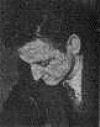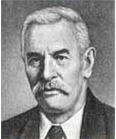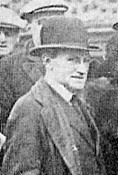Mu
Mueller, Hermann (1876-1931)
Social Democratic chancellor of a German coalition government, 1928-30.
Mukherji, Basanta Dev
Joined Calcutta Trotskyist circle 1937. Founding member Bolshevik Leninist Party of India, 1942. Worked in Varanasi, 1942-45. Attended BLPI conference, 1948. Entered SP with BLPI, 1948. Leader, Communist League, in the ‘fifties and ‘sixties. Central Secretariat, Revolutionary Workers Party, 1958-60. Elected to IEC of Fourth International. Central Committee, RCPI, elected 1960.
Compiled by Charles Wesley Ervin
Munis, Grandizo (1912-1989)
 Spanish Trotskyist. Became a member of the Spanish
section of the International Left Opposition in 1930, later the Spanish
section of the Socialist Party, 1935 and then regrouped the Left Opposition as the
Spanish Bolshevik-Leninists after the start of the Spanish Civil War. He
split with the Trotskyist movement after WWII eventually publishing a
state-capitalist analysis of the USSR.
Spanish Trotskyist. Became a member of the Spanish
section of the International Left Opposition in 1930, later the Spanish
section of the Socialist Party, 1935 and then regrouped the Left Opposition as the
Spanish Bolshevik-Leninists after the start of the Spanish Civil War. He
split with the Trotskyist movement after WWII eventually publishing a
state-capitalist analysis of the USSR.
See also Grandizo Munis Archive
Münzer, Thomas (1490-1525)
German revolutionary. Leader of German Anabaptist peasants during the Reformation. Advocate of utopian communism. He turned against Martin Luther both on doctrinal grounds and over the latter's support for the Protestant princes. Executed by the German government for his beliefs.
Further Reading: Thomas Muenzer by Emanuel Garrett.
Muralov, Nicolai Ivanovich (18.. - 1937)
A soldier in an automobile unit of the army in Moscow at the time of the February 1917 revolution, Muralov brought the first complete and disciplined military detachment over to the side of the Revolution, occupying the wireless station and other points. Muralov was subsequently commander of the Moscow Military district, and a hero of the Civil War. Once Deputy Commissar of Agriculture, himself an agronomist, he was one of the few old Bolsheviks who, like Rykov and Shliapnikov, participated directly and actively in the 1905 revolution. Imprisoned for insufficient sycophancy to Stalin, and shot in 1937.
My unbroken fighting friendship as well as my political friendship with Muralov began then. I must say at least a few words about the man. Muralov is an old Bolshevik who went through the revolution of 1905 in Moscow. In Serpukhov, in 1906, he was caught in the pogrom of the Black Hundred – carried out, as usual, under the protection of the police. Muralov is a magnificent giant, as fearless as he is kind. With a few others, he found himself in a ring of enemies who had surrounded the building of the Zemstvo administration. Muralov came out of the building with a revolver in his hand and walked evenly toward the crowd. It moved back a little. But the shock company of the Black Hundred blocked his path, and the cabmen began to howl taunts at him. “Clear a way,” ordered the giant without slackening his advance, as he raised the hand holding the revolver. Several men pounced on him. He shot one of them down and wounded another. The crowd drew back again. With the same even step, cutting his way through the crowd like an ice-breaker, Muralov walked on and on toward Moscow.
His subsequent trial lasted for two years, and, in spite of the frenzy of the reaction that swept over the country, he was acquitted. An agricultural expert by training, a soldier in an automobile detachment during the imperialist war, a leader of the October fighting in Moscow, Muralov became the first commander of the Moscow military region after the victory. He was a fearless marshal of the revolutionary war, always steady, simple, and unaffected. In his campaigning he was a tireless living example; he gave agricultural advice, mowed grain, and in his free moments gave medical treatment to both men and cows. In the most difficult situations he radiated calm, warmth, and confidence. After the close of the war, Muralov and I always tried to spend our free days together. We were united too by our love of hunting. We scoured North and South for bears and wolves, or for pheasants and bustards. At present, Muralov is hunting in Siberia as an exiled oppositionist.
In the July days of 1917, Muralov held his head up, as usual, and encouraged many others. In those days, we all needed a lot of self-control to stride along the corridors and halls of the Taurid Palace without bowing our heads, as we ran the gauntlet of furious glances, venomous whispers, grinding of teeth, and a demonstrative elbowing that seemed to say: “Look! Look !” There is no fury greater than that of a vain and pampered “revolutionary” philistine when he begins to perceive that the revolution which has suddenly lifted him to the top is about to threaten his temporary splendor.
[From My Life, Trotsky 1930]
Muranov, Matvei Constantinovich (1873-1959)
 The son of a peasant in Poltava, from 1900, Muranov was a railway worker in Kharkov. One of six Bolsheviks who were elected to the Fourth Duma in 1912. At the start of WWI, the deputies proclaimed: “The guns should be turned not against our brothers, the wage slaves of other countries, but against the reactionary and bourgeois governments and parties of all countries.”
The son of a peasant in Poltava, from 1900, Muranov was a railway worker in Kharkov. One of six Bolsheviks who were elected to the Fourth Duma in 1912. At the start of WWI, the deputies proclaimed: “The guns should be turned not against our brothers, the wage slaves of other countries, but against the reactionary and bourgeois governments and parties of all countries.”
On February 10, 1915, the Bolshevik duma deputies were tried in Petrograd, and were charged under Article 102, i.e. accused of organising the overthrow of the government. The main circumstantial evidence against the Bolshevik deputies was Lenin’s theses The Tasks of Revolutionary Social-Democracy in the European War and the C.C. R.S.D.L.P. manifesto The War and Russian Social-Democracy, which were confiscated during the police search at the illegal Party Conference in Ozerki. The dupties were threatened with execution, but ultimately were exiled for life to Turukhansk Territory (Eastern Siberia).
Lenin explained Muranov's remarks during his trial:
“Understanding that the people did not send me into the State Duma for the purpose of wearing out the seat of a Duma armchair, I travelled about the country to ascertain the mood of the working class.” He admitted at the trial that he took upon himself the function of a secret agitator of our Party, that in the Urals he organised a workers’ committee at the Verkhneisetsky Works, and in other places. The trial showed that after the war broke out members of the R.S.D.L. group travelled through almost the whole of Russia for propaganda purposes, that Muranov, Petrovsky, Badayev and others arranged numerous workers’ meetings, at which anti-war resolutions were passed, and so forth.
Socialism and War, Lenin
In 1904 Muranov joined the Bolshevik Party. In 1907, he was one of the leaders of the railway district committee Bolshevik Party in Kharkov. In 1912, he became a Deputy in the State Duma for Kharkov, while continuing to carry out illegal work in Petersburg, Kharkov, Ivanovo-Voznesensk. In November 1914 together with other members of Bolshevik Duma fraction he was arrested and exiled to Turukhanskiy edge.
On 12 March, after the February 1917 revolution, he returned to Petrograd, and was admitted to the Russian Bureauof the Bolshevik Central Committee and on 16 March joined Pravda. From April, he participated in establishing the Proletarian in Kharkov.
A participant in the October insurrection, he became a substitute delegate for Internal Affairs of the RSFSR. In 1919 to 1924 he was either a member or a candidate members of the Central Committee of the All-Russian Communist Party.
In 1923, he became a member of the board of the Supreme Court of the USSR. From 1934 he worked in the apparatus of the All-Russian Central Executive Committee. In 1939 he retired on a pension, and died in 1959.
Murphy, John Thomas (J. T.) (1888-1965)
 John Thomas (J.T.) Murphy was a leading British trade unionist and significant figure in 20th century British Communism.
John Thomas (J.T.) Murphy was a leading British trade unionist and significant figure in 20th century British Communism.
Born in Manchester, England, economic hardships forced him to leave school at age 13 to apprentice at the Vickers engineering factory. He continued to study, however, and soon he became a superintendent of a local Sunday School and a preacher in the Primitive Methodist Church. This, Murphy stated, prepared him well for a life of public speaking.
Theological debates with Socialists in the factory, along with his continued studies of philosophy, evolution and other sciences—all in the context of the bitter labor struggles of the time—led Murphy to abandon his religious faith and embrace militant industrial unionism. Influenced by Tom Mann and James Connolly, Murphy rejected parliamentary reformism and came to believe that Socialism could only be achieved through working class independence and militant struggle.
World War I presented new opportunities to put theory into practice. Across the country rank-and-file movements headed by shop stewards battled not only employers, but also challenged the authority of the union bureaucracies for their class collaborationist policies and outright betrayals.
As the war dragged on, the need for materiel to fuel the war effort greatly impacted the engineering industry. Murphy was active in the ensuing struggles through his involvement with the Sheffield Workers’ Committee, which brought him in contact with the future founding members and early leading figures of the Communist Party of Great Britain: William Gallacher, Tom Bell, William Paul and Arthur MacManus.
In 1917 Murphy was elected to the national leadership of the Workers’ Committees and Shop Stewards’ Movement, the National Administrative Council (NAC), along with Arthur MacManus, who ultimately recruited Murphy to the Socialist Labour Party (SLP). During this period, Murphy’s stature as a respected leader and theorist continued to grow. His political thought in the years following the Russian Revolution evolved from De Leonist syndicalism to Bolshevism.
In January 1919, Murphy, MacManus, Paul and Bell represented the SLP in discussions with other revolutionary socialist groups in Britain to form a single Party, a Communist Party, affiliated with the Third (Communist) International. These negotiations were long and contentious and stalled over a number of issues, primarily affiliation with the Labour Party. Before their conclusion, Murphy traveled to Moscow as part of the British delegation to the Second Congress of the Comintern where his political evolution to Marxism-Leninism was finalized.
While in Moscow, Murphy took part in the early efforts to establish a Red trade union International—later named the Red International of Labor Unions (RILU), also called the “Profintern”—to unite revolutionary trade unionists worldwide into a single organization to rival the reformist Amsterdam International. Along with Alfred Rosmer and Mikhail Tomsky, Murphy was elected to the provisional leadership and was tasked with the responsibility of returning to England to establish the British Bureau, and then travel back to Moscow for its first Congress.
In addition to his work with the RILU, Murphy was a significant figure in the Comintern. He was a member of the Executive Committee of the Communist International (ECCI) and headed the British section, which included Ireland and the colonies, and, later, the Anglo-American Committee. He was also a member of the Eastern Commission that handled issues relating to China and Japan, and, in 1926, was elected to the Presidium and Political Secretariat.
His rise in the Comintern apparatus coincided with Stalin’s consolidation of power. Murphy was acutely aware of the CPSU’s internal conflicts and ultimately sided with Stalin over Trotsky and the Left Opposition. Following the Fifth Congress of the Comintern in 1924, Murphy returned to England and, at a council meeting of the CPGB, moved the main resolution denouncing Trotsky for his “open attack upon the present leadership of the Communist International, which in the opinion of the CPGB, will not only definitely encourage the British Imperialists, the bitterest enemies of Soviet Russia, but will also encourage their lackeys of the Second International, and those other elements who stand for the liquidation of the Communist International and the Communist Party in this country.”
Three years later, it was Murphy who moved the Presidium resolution expelling Trotsky from the ECCI.
In 1932 Murphy came into conflict with the CPGB leadership when he advanced the idea that the Party should mount a campaign to pressure employers and the British government to give credits for industrial products to the Soviet Union. Harry Pollitt, the Party’s General Secretary, disagreed on the grounds that this would solve the country’s market crisis and undermine current campaigns. He demanded that Murphy publicly admit his mistake. Murphy refused, and resigned from the Party.
(Derived in part from Ralph Darlington’s The Political Trajectory of J. T. Murphy.)
Further Reading: J. T. Murphy Archive.
Muthiah, Bodi Manickam. (1914-ca. 1985)
Born in small village near Bodi (Theni District, Tamil Nadu), son of a poor peasant. Educated Pasumalai High School, Madurai. Joined Congress and became Taluk Congress President. Participated in the Individual Satyagraha campaign, 1940-41. Jailed for a year. Joined Madurai unit of Bolshevik Leninist Party of India, 1943; shifted to Madras. Organizer, MSM Railway workshops, Perambur, and B&C Mills, Madras, 1944-45. Arrested in Madras, 1945. Member of the strike committee, Madras Labour Union strike of 1947; jailed under Congress Ministry. Entered SP with the Bolshevik Leninist Party of India, 1948. Worked in his constituency. Eventually retired to his native village, Bodi. Lived on his Freedom Fighters’ Pension. He never married.
Compiled by Charles Wesley Ervin
Muzhik Vredny
Part of the pseudonym of the poet Y. A. Pridvorov. (Muzhik Vredny Demyan Bedny)